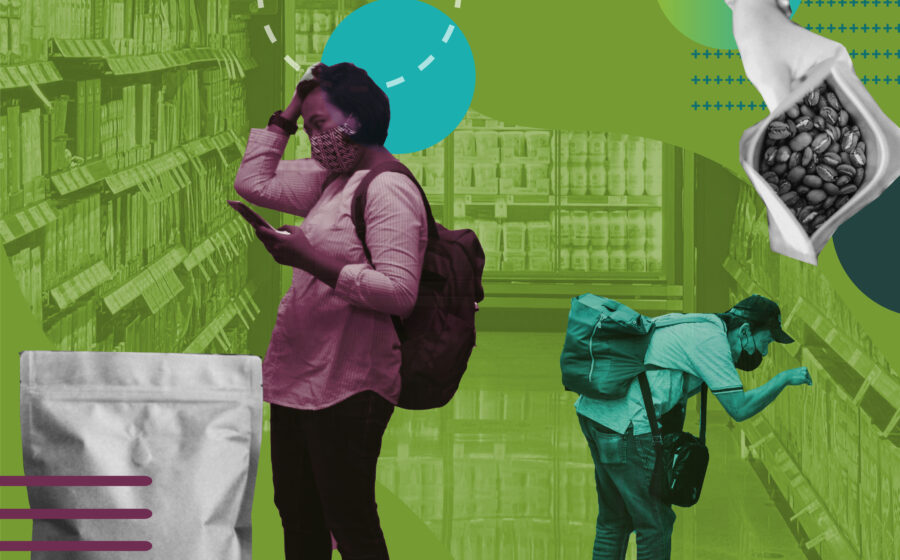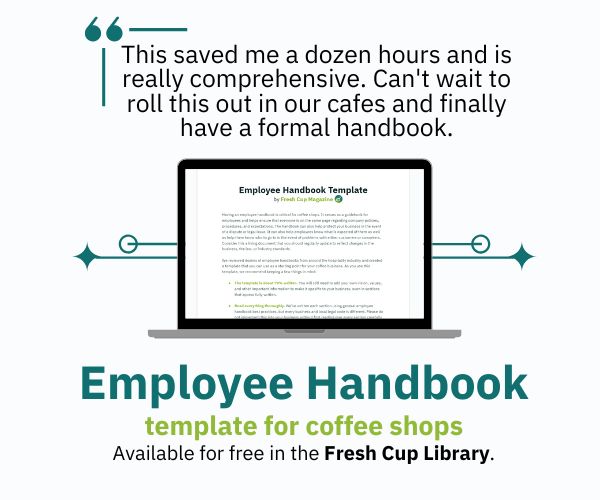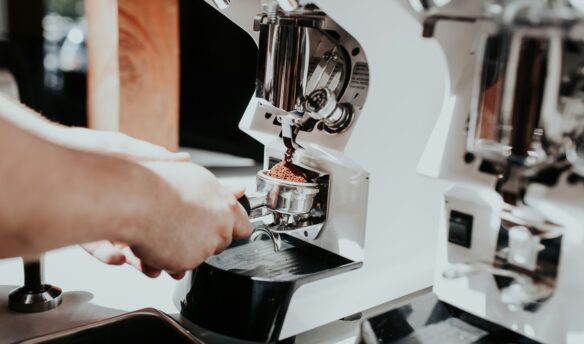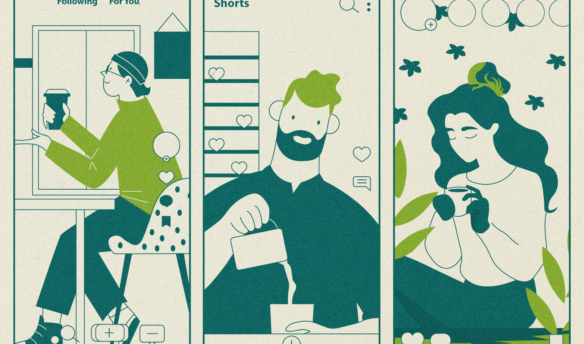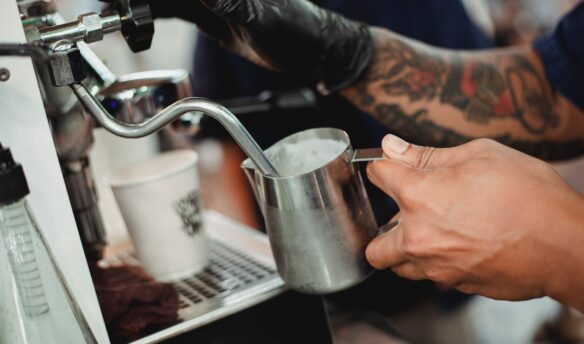Pay close attention to the packaging the next time you stroll down the coffee aisle at a grocery store. How many certification logos can you find? What do they mean? What does it take to receive a certification? Is it clear who benefits?
Certification programs aim to provide transparency about the practices used to produce and sell a product—and they’re not just limited to coffee. You’ve likely seen certification logos on almost every item you’ve ever purchased, like USDA Certified Organic, Fair Trade USA, Smithsonian Bird-Friendly, and Rainforest Alliance. Certification logos can tell consumers that the beans from an individual farm, cooperative, or company align with and uphold a particular set of values and standards.
But could you articulate what it means for a food to be certified organic, what B-corp means, or how coffee is sourced through a direct trade model? As much as these small little certification logos printed on the items we consume intend to tell us about a product, there is still a lot of mystery around what these certifications mean and the efficacy and benefit of these programs. We chat with business owners and industry players to determine the merits of coffee certifications and how they communicate value to consumers.
Determining Value For Roasters
Coffee By Design, a roastery in Portland, Maine, began looking at certifications for their facility as a way to communicate with customers beyond simply stating their values. “As we started to look at the various certification programs out there and what our customers were asking for, the two most common were organic and Fair Trade,” says Mary Allen Lindemann, co-founder and community builder at Coffee By Design.
To decide which certifications to pursue, Lindemann began breaking down the differences between each program—and how each would play out in the roastery. For example, the USDA Organic program focuses on how a crop, such as coffee beans, is produced and is governed by the US Department of Agriculture, but requires checks from the beginning of the coffee chain to the end. This certification guarantees that a bag of coffee beans has followed all of the USDA’s outlined organic practices, from farming to roasting, requiring all parts of the production process to be certified.
Other certification programs are focused solely on coffee at the farm level. For example, Fair Trade is a certification program that aims to protect the livelihoods of coffee farmers and their families through a minimum price paid for green coffee. Founded in 1998, Fair Trade USATM is an independent third-party certification program originally tied to Fairtrade International until it broke off from the organization in 2011. Fairtrade International then launched Fairtrade America as its US branch. Both certification programs aim to provide sustainable solutions for farmers and their families through pricing premiums. When Lindemann was researching certification programs, she looked specifically at TransFair USA, which would become Fair Trade USA.
This pricing model includes three price points: a minimum price per pound, a Fair Trade premium, and an organic differential. As of May 2022, the minimum Fair Trade USA and Fairtrade America price per pound is set at $1.40/lb with a $0.20 Fair Trade premium and a $0.30 increase for coffees that also have an organic certification. However, both programs default to the commodities market price if that price per pound is higher than the fair trade minimums. The $1.40/lb minimum price ensures that farmers receive fair compensation should the market fall below this threshold.
There are other types of certification programs: some that look at the business practices of a retailer; some that look solely at the raw materials or what’s being sourced; or, like organic certification, some that require a mix of sourcing and retail practices multiple actors must agree to. Coffee By Design ultimately chose to become a USDA-certified organic roasting facility, which means they can sell certified organic coffees at the farm level (they also sell non-organic coffees, which most roasters are allowed to do as long as coffees are kept separate). “At the time, the organic certification made a lot of sense to us. We said, ‘why not look at farms that have been certified?’ We should take the time and effort to make sure our manufacturing facility is certified as well,” says Lindemann. “We knew that it was a matter of that third-party saying, ‘Yes, this coffee and facility meet [quality standards] within the guidelines.'”
What Guiding Principles?
From a consumer perspective, certifications streamline purchasing decisions by providing a visual representation of one’s values. In a recent YouTube video, coffee professional and co-founder of Square Mile Coffee Roasters in London, James Hoffmann, said, “a helpful way to think about these certifications is to consider which set of values overlap with your own.” Basically, certifications can be a way for coffee roasters to declare their values front and center on a bag of coffee and for consumers to find information quickly—but what does each certification actually represent?
Much of the confusion surrounding coffee certification programs lies in the intent of each certification and how consumers take in the information presented to them on a bag. It’s easy to group certifications together to represent a group of coffees as “better” or “more sustainable.” However, most certifications have a distinct mission and work to promote a specific set of values.
For example, Fair Trade USA is a certification program that seeks to establish standards based on moral principles—higher premiums, economic development, and healthy working conditions. These principles are displayed on their website: “Fair Trade Certified™ is an award-winning, rigorous, and globally recognized sustainable sourcing model that improves livelihoods, protects the environment, and builds resilient, transparent supply chains.”
B Corp is another certification program gaining traction in the coffee industry. The B Lab, a nonprofit network responsible for certifying businesses, defines B Corp Certification as “a designation that a business is meeting high standards of verified performance, accountability, and transparency on factors from employee benefits and charitable giving to supply chain practices and input materials.”
On the other hand, organic certifications narrow in on how an item is grown and processed, and certification is often conferred by a government entity. In the US, the United States Department of Agriculture (USDA) defines organic certification as “foods [that] are grown and processed according to federal guidelines addressing, among many factors, soil quality, animal raising practices, pest and weed control, and use of additives. Organic producers rely on natural substances and physical, mechanical, or biologically based farming methods to the fullest extent possible.” While obtaining organic certification may indirectly lead to ethical benefits, price premiums are not required to receive the certification.
The distinction between government-facilitated and value-driven certifications does not position one over the other. Instead, these differences guide coffee companies and consumers to the certifications that best align with their professional and personal values.
The Certification Is Coming From Inside The House
Beyond the well-known coffee certification programs, several larger companies—most notably Starbucks and Nespresso—have developed internal programs to guide purchasing and sourcing decisions. Sometimes these companies will place stickers or logos on their bags that look like the markers of third-party certification bodies.
Hoffmann notes in his video that these programs are in place for supply chain control. “It’s about having a guaranteed supply of the qualities of coffees that they need and want for their businesses, sourced in a way that marries up with the perceived ethics of their customer base and hopefully the ethics of the company itself.”
Starbucks’ internal certification, called Coffee and Farmer Equity (CAFE) Practices, is “a verification program that measures farms against economic, social and environmental criteria.” Their practices are monitored by SCS Global Services, who are charged with checking farms against 200 different indicators. Nespresso has the AAA Sustainable Quality™ Program, created with the Rainforest Alliance, and Peet’s Coffee announced its sourcing practices were verified by Enveritas, a nonprofit organization that provides “sustainability assurance for the coffee industry,” according to their website.
These programs rely on verification from outside parties, and there’s some ambiguity about how rigorously standards are applied. For example, Starbucks’ CAFE Practices program has come under fire more than once, with reports of forced labor linked to farms that received the company’s internal accreditation. Starbucks’ website doesn’t state how often audits of accredited farms happen, but reports allege that farms can go 2-3 years without being audited.
What Does It All Mean?
There’s a common belief that coffee that has earned a certification is automatically better. But better how? Is it more sustainable? Does it taste better? What does the certification mean for the coffee inside the bag?
Stuart Ritson of Osito Coffee, a small importing company, says the benefit of certification isn’t always about flavor but about impact. “It is a bonus and a benefit to a producer who does Fair Trade and organic [certification] that even if their coffee is commodity level and not particularly good in terms of cup quality,” says Ritson, “they can still get a price that’s very decent for that coffee.”
That lines up with how consumers use certifications: as a way to make socially and environmentally responsible purchase decisions. In a study by Wiser, 74% of participants reported being more likely to purchase a product with the USDA Organic logo.
However, the actual veracity of a certification’s programs—or their impact—can be challenging to ascertain just by looking at a bag. Without a clear understanding of what a certification means, consumers can accidentally assume a coffee is doing more good than it is. Take greenwashing, or promoting a product as more environmentally or socially responsible than it is. In the coffee industry, this can look like promoting a bag of beans as organic without receiving USDA certification (the USDA has a whole section on its website about proper labeling protocols) or making claims about sustainable farming practices without proof. In 2022, Keurig Green Mountain was ordered to pay a $10 million settlement after falsely claiming its coffee pods were recyclable in company advertisements.
Fair Trade America has even coined the term fairwashing, or when “companies misrepresent how equitable they are in terms of labor practices, wages, and equality for workers.” Their website encourages consumers to be cautious and critical when reading a label: “Unlike vague buzzwords, certifications on product packaging (like our Fairtrade label) do have standards and regulations. These labels offer real protection to the environment and to workers. You should be able to research the labels and see clearly defined standards and regulations listed transparently online.”
Coffee certification programs can help validate a business’ practices according to specific standards, but like in most instances, clarity is essential. When you pick up your next bag of coffee, look carefully at the bag, and don’t be afraid to ask questions and search for information to see if a certification is authentic, goes beyond buzzwords, and aligns with your values.

